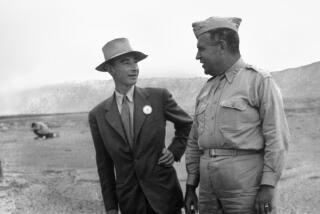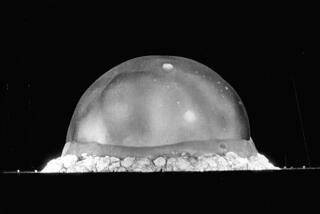Robert B. Brode; Cosmic Ray Research Pioneer
- Share via
BERKELEY — A private funeral service was set for physicist Robert Bigham Brode, a pioneer cosmic ray researcher and member of the World War II Manhattan Project that developed the atomic bomb.
Brode, who died Wednesday at the age of 85, retired from the University of California at Berkeley in 1967 but continued as an academic administrator in the university system.
At the outset of World War II, Brode was asked to lead a research team that developed the first proximity fuse for high explosive bombs and later headed a group that applied the concept to the triggers for the first atomic bombs.
Brode served briefly as director of UC’s Space Sciences Laboratory and later as director of the Berkeley campus’ academic program in London.
Brode, a Rhodes scholar at Oxford, conducted research at Cambridge and Manchester Universities in England and was a pioneer in cosmic ray studies.
Brode, a native of Walla Walla, Wash., received his Ph.D from California Institute of Technology in 1924 and joined the Berkeley faculty in 1927.
He is survived by his wife, Bernice Bidwell Brode, and a son, John, a computer scientist in Cambridge, Mass.
More to Read
Sign up for Essential California
The most important California stories and recommendations in your inbox every morning.
You may occasionally receive promotional content from the Los Angeles Times.












